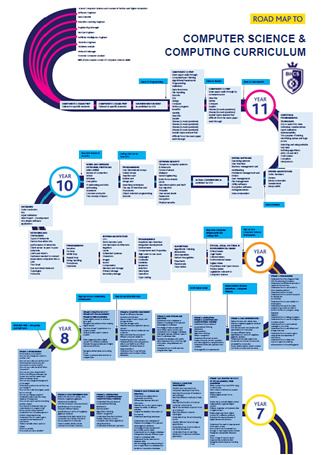Computer Science
Our Vision
“Everybody should learn how to code because it teaches you how to think”
Steve Jobs
We want our students to understand and play an active role in the digital world that surrounds them. They must be able to analyze problems in computational terms and have repeated practical experience of writing computer programs to solve problems.
Key Stage 4
Computer Science is a modern, fascinating subject. It is fun and it gives students huge opportunities in life. The world depends on computers. In this GCSE course you will learn about how computers work, the networks they use and how programming can create solutions to everyday problems and future challenges. Computer Science is a great subject but combined with other subjects it can open a whole world of opportunities.
Computer Science is a practical subject where students can apply the academic principles learned in the classroom to real-world systems. It’s an intensely creative subject that combines invention and excitement and can look at the world through a digital prism. We believe that every student should have exposure to and experience of the joy of programming.
We offer Computer Science in Year 9 as a GCSE option. This is a practical course with three periods per week, split between learning theoretical concepts and learning to code in a high-level programming language. We build significantly on the knowledge developed in Key Stage 3. Students learn advanced techniques including interface design, algorithms, data structures and file handling.
Course Content: The content of this GCSE (9-1) Computer Science is divided into 2 components:
Component 01: Computer Systems
Introduces student to Systems architecture, computer memory and storage, computer networks, connections and protocols, network security, data representation, and system software. It also looks at ethical, legal, cultural, and environmental concerns associated with computer science.
Component 02: Computational thinking, algorithms and Programming
Students apply knowledge and understanding gained in component 01. They develop skills and understanding in computational thinking: algorithms, programming fundamentals, producing robust programs, computational logic and translators, programming language and integrated development environment.
Practical programming:
Students are to be given the opportunity to undertake a programming task(s) during their course of study which will allow them to develop their skills to design, write, test, and refine programs using a high-level programming language. Students will be assessed on these skills during the written examinations, in particular component 02.
Enrichment Opportunities
Students can attend coding club after school and go on educational trips to local further education colleges to learn about courses in Computer Science. We also offer opportunities to visit Google.
Assessment
Paper 1: Computer Systems (01):
This is a 1.5 hour written paper comprising 50% of the total GCSE. The following sections are tested:
- System architecture
- Memory and storage
- Computer networks, connection, and protocols
- Network security
- Systems software
- Ethical, legal, cultural, and environmental impacts of digital technology.
Paper 2: Computer Systems (02):
This is a 1.5 hour written paper comprising 50% of the total GCSE. The following sections are tested:
- Algorithms
- Programming fundamentals
- Producing robust programs
- Boolean logic
- Programming languages and Integrated Development Environments.
- In section B, questions assessing student’s ability to write or refine algorithms must be answered using a high-level programming language.
Practical Programming:
All students will be given the opportunity to undertake a programming task either to a specification or to solve a problem during their course of study.
GCSE’s (9-1) Computer Science is a qualification that will enable students to progress to further qualifications, either vocational or general.

